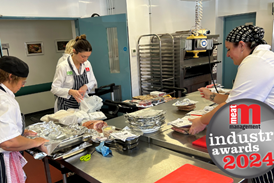Trade organisations within the UK meat industry have said more detail is needed following the unveiling of a new set of agricultural policies rolled out this week by Defra environment secretary, George Eustice.

The new policies aim to drive farming towards a more sustainable future, with a series of measures put in place to help the Government reach its climate change targets.
A new Environmental Land Management is one of the most significant measures introduced as part of the roadmap. This scheme will aim to incentivise sustainable farming practices, create habitats for nature recovery and establish new woodland to help tackle climate change.
As well as this, Government also revealed further investment into animal health and welfare and a Farming Investment Fund, which will look to support innovation and productivity.
Responding to the new measures, Nick Allen, chief executive of the British Meat Processors Association (BMPA), said: “The new Agriculture Roadmap will have deep and lasting implications which will be felt up and down the food supply chain. As it stands, we will need much more detail and this will need to be scrutinised carefully to fully anticipate both the intended and unintended consequences.
“With changes this big, we need to be careful not to put the ‘cart before the horse’. Before big changes to agricultural, environmental and trade policy are made and before money is spent on implementing them, we first need to have a clear and defined picture of Government’s plan and target for food security, self- sufficiency and environmental aims. We hope that the proposed public consultation on the Agricultural Roadmap together with part two of Henry Dimbleby’s National Food Strategy, both scheduled for 2021, will provide this clarity.”
“We also need to remember that we are embarking on a change in Government farm support policy at a time when there is still huge uncertainty over our markets."
Tony Goodger of the Association of Independent Meat Suppliers (AIMS) added: “AIMS acknowledges the publication of the ‘The Path to Sustainable Farming: An Agricultural Transition Plan 2021 to 2024’ as it provides some clarity to livestock farmers in the immediate years after the UK exit from the EU.
“The focus of the plan is, understandably based on farm and AIMS awaits further details on the standards that will deliver better animal welfare.
“It is disappointing that the plan says little about the post farm gate supply chain and the role it can play in delivering better on farm outcomes for livestock farmers.”
National Sheep Association chief executive, Phil Stocker, said: “Change is uncomfortable, particularly when farmers livelihoods depend on it, but we have known for the last four and a half years that change is coming, so the announcement of the planned transition for farmers and land managers in England is welcome - as is the fact that Defra has clearly been working hard to take on board the views of farming organisations such as NSA and many others.
“There is a long way to go before we can be confident of the final outcomes of these huge changes in the way the Government supports farmers, and it is going to be really important for the industry and Defra/ Government to keep reminding ourselves that the next seven years still need to be about learning and fine-tuning schemes, or even more radical change where appropriate. We need more detail and look forward to working closely with Defra over the future months and years, putting flesh on the bones of the skeleton of what the Secretary of State has announced.
“We also need to remember that we are embarking on a change in Government farm support policy at a time when there is still huge uncertainty over our markets and trade post 1st January 2021 when we finally leave the EU. With just over 30 days to go we still don’t know what our trade relationship will be. For the sheep sector we know what the risks of suddenly adding 46% tariffs on the 35% of our production that goes to the EU would be and it is deeply concerning.”
This story was originally published on a previous version of the Meat Management website and so there may be some missing images and formatting issues.





